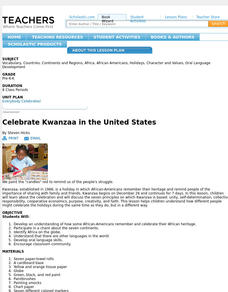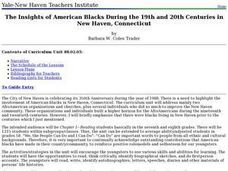Carolina K-12
Affrilachia
What makes a culture unique? Learners research life in the Appalachia region of the United States. Poetry, music, and oral history create Affrilachia, the term used to describe the lifestyle of the area. African-American mountain culture...
Library of Congress
The Harlem Renaissance
The Harlem Renaissance brought forth many American art forms including jazz, and the writings of Zora Neale Hurston and Langston Hughes. Using a carefully curated set of documents from the Library of Congress, pupils see the cultural...
Curated OER
Celebrate Kwanzaa in the United States
Explore the components of the African American celebration of Kwanzaa in the United States. Complete with learning objectives, a materials and preparation list, and eight days of lesson plans, the resource incorporates the principles of...
PBS
Rosa Parks: Civil Rights Activist
Scholars examine the courageous efforts made by civil rights activist, Rosa Parks. Discussion questions and a brief writing assignment follows a short film. A photograph and a silent film delve deeper into Park's history and three...
Curated OER
Chapter 28: Red Flags and Velvet Revolutions: The End of the Cold War, 1960-1990
Set your historians up for testing success using this interactive flashcard tool. It is one of many learning strategies offered in this thorough online resource. Although designed for use with a text, the site is valuable independently....
Curated OER
Benne Cakes and Other Holiday Recipes
Benne Cakes, a West African treat packed with sesame seeds for luck, are a featured part of the celebration of Kwanzaa. Young chefs try their hand at crafting these goodies that are sure to enrich your holiday...
Curated OER
Cultural and Social Transformation since 1865
Students research the evolution of cultural and social issues in areas of Westward Expansion, Immigration, and Civil Rights. They practice writing clear details with supporting evidence and examples and evaluate ways of improving drafts...
Education World
Black History 104
Who was the originator of the Blood Bank? What fur and grain trader founded the city of Chicago? Who invented the ironing board and lawn sprinklers? A 10-clue matching activity launches a scavenger hunt for information about famous, yet...
Curated OER
Let Your Motto Be Resistance: African American Portraits: Grades 3-5
Students explore the contributions of African Americans of the 20th century. In this African American history instructional activity, students examine portraits of Muhammad Ali, Romare Bearden, Lorraine Hansberry, Judith Jamison, and...
Curated OER
Understanding and Appreciating Poetry: Afro-Americans and Their Poetry
Sixth graders are introduced to poems written by African-American authors. As a class, they read excerpts of poems from different time periods and discuss how and if anything has changed over time with discrimination and equal rights...
Curated OER
Celebrate Kwanzaa in the United States
Students explore and study the celebration of Kwanzaa in which African-Americans remember their heritage and remind people of the importance of sharing with family and friends. They participate in a chant about the seven continents and...
Curated OER
The Insights of American Blacks During the 19th and 20th Centuries in New Haven, Connecticut
Students examine the contributions of African Americans in New Haven, Connecticut in the 19th and 20th centuries. After being introduced to new vocabulary, they review the elements of autobiographies and read excerpts of African...
Curated OER
Art: Faith Ringgold Story Quilts
Twelfth graders examine the impact of African American culture on the United States by inspecting Faith Ringgold's story quilts. Working in groups, they create a collective story quilt about current cultural issues. They research their...
Curated OER
The Finish Line
Students investigate the philanthropy of various cultural traditions. In this cultural education lesson, students read a handout about Native American, European American, and African American traditions and identify the philanthropic...
Smithsonian Institution
Separate is Not Equal: Fight for Desegregation
Separate is not equal! An eye-opening lesson delves into the past to understand the fight for desegregation and how it impacted African American communities. Academics complete two one-hour lessons using documents, photographs, and...
Teaching Tolerance
Dismantling Racial Caste
It's time to end racism. The final installment of the series encourages scholars to consider what is needed to ended the racial caste system in the U.S. Young historians complete group discussion, written prompt, and a hands-on-activity...
Smithsonian Institution
Resistance to School Desegregation: The Boston Busing Crisis
Despite how it sounds, Boston's busing crisis wasn't a transportation problem. Academics address the problems faced by African Americans following school desegregation and the struggle to receive equal educational opportunities. Scholars...
Teaching Tolerance
Understanding the Prison Label
Break the chain. An engaging lesson examines why it is so hard to break free of the prison system in the US. Academics participate in a reader's theater, read primary sources, and discuss their thoughts. The lesson explains the hardships...
Pace University
The Harlem Renaissance - The Journey to Freedom: An Interdisciplinary
The Harlem Renaissance if the focus of a carefully crafted, interdisciplinary unit designed to introduce middle schoolers to the contributions key figures made to American art and culture during the period. Class members select...
Facing History and Ourselves
After Charlottesville: Public Memory and the Contested Meaning of Monuments
Are Civil War monuments a kind remembrance or a reminder of a dark past? The lesson plan focuses on the public's memory of the Civil War and the monuments that represent it. Young academics explore past efforts to change historical...
Teaching Tolerance
The War on Drugs—Mechanisms and Effects
The war on drugs doesn't have definite results. An interesting lesson examines the social, political, and economic effect of the war on drugs. Academics learn how the war on drugs has led to mass incarcerations and negatively affected...
Teaching Tolerance
Racial Disparity in the Criminal Justice System
Explore the impact of the war on drugs in a thought-provoking lesson for high school academics. Young historians delve into the world of the criminal justice system and the racial disparity that occurs in the US. The resource provides...
Teaching Tolerance
Parallels Between Mass Incarceration and Jim Crow
Is history repeating itself? A riveting lesson examines the parallels between mass incarceration in the U.S. and the Jim Crow Laws of the past. Academics review Jim Crow Laws and compare them to mass incarcerations of African Americans....
Facing History and Ourselves
After Charlottesville: Contested History and the Fight against Bigotry
History doesn't always reflect all sides. Academics discover how the remembered history of the Civil War differs for White and African Americans. The lesson explores how Civil War monuments and celebrations have racist connotations for...























